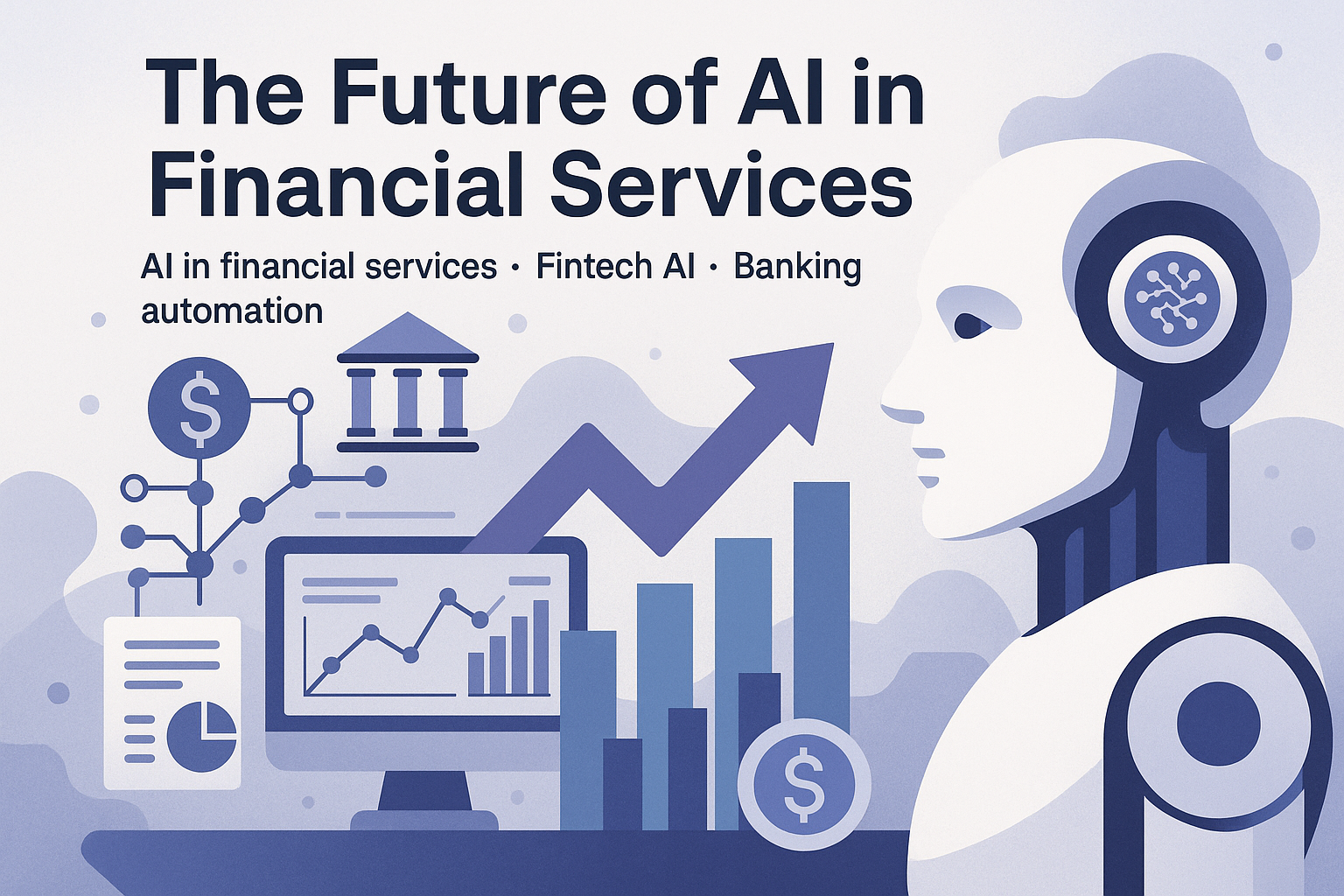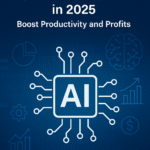Artificial Intelligence (AI) is not just another technology trend—it is a paradigm shift that is fundamentally transforming how the financial world operates. In a sector where speed, accuracy, and trust are everything, AI has moved from the realm of experiments to a critical business tool. Whether it’s predicting fraud before it happens, processing loan approvals in seconds, or tailoring investment strategies for each customer, AI is rapidly reshaping finance from top to bottom.
In this comprehensive guide, we will explore the history of AI in finance, its current applications, future trends, potential risks, and the steps financial institutions should take to adopt AI responsibly. We will also showcase real-world examples and provide a roadmap for implementing AI in ways that maximize both profitability and customer satisfaction.
A Brief History of AI in Financial Services
The concept of automation in finance is not new. Banks have been experimenting with data-driven decision-making for decades. However, true AI—systems that learn, adapt, and make predictions—has only become practical in recent years due to advances in computing power, cloud technology, and big data analytics.
- 1980s–1990s: The earliest forms of automation in finance were algorithmic trading programs. These systems allowed traders to execute thousands of transactions in milliseconds, capitalizing on market inefficiencies.
- 2000s: Banks began implementing advanced risk modeling software to meet regulatory requirements and improve credit decision-making.
- 2010s: The rise of mobile banking created a demand for AI-powered chatbots, robo-advisors, and predictive analytics to enhance customer engagement.
- 2020s: Deep learning, natural language processing, and generative AI now power fraud prevention, loan underwriting, investment advice, and personalized marketing.
Current Applications of AI in Financial Services
AI has embedded itself in nearly every aspect of financial services. From the back office to the customer-facing front end, AI-powered systems are driving efficiency, accuracy, and innovation.
Banking Automation for Operational Efficiency
Banking automation is perhaps the most visible way AI is streamlining operations. In traditional banking, processes like loan underwriting, KYC (Know Your Customer) compliance, and transaction reconciliation are highly manual and error-prone. With AI, these tasks can be completed in seconds with higher accuracy.
For example, JPMorgan Chase’s COiN (Contract Intelligence) platform uses AI to analyze complex commercial loan agreements. What once took legal teams 360,000 hours annually now takes a few seconds—saving millions in operational costs.
Fraud Detection and Risk Management
Fraud is one of the costliest challenges in finance, with billions lost annually worldwide. AI mitigates this by identifying suspicious activities in real time. Machine learning models analyze massive datasets to detect unusual patterns in spending, location, or device usage. If anomalies are found, transactions can be blocked instantly, and alerts sent to both the customer and bank security teams.
Mastercard’s Decision Intelligence tool is a prime example. By leveraging AI, it reduces false declines—transactions wrongly flagged as fraud—while maintaining high fraud detection accuracy.
Fintech AI for Customer Experience
Fintech companies have been at the forefront of leveraging AI to improve customer engagement. AI-driven mobile apps can provide personalized financial insights, budgeting tips, and real-time alerts about unusual spending.
Cleo AI, for example, uses natural language processing and gamification to make financial management more engaging. It communicates with users via a chatbot, offering tips, reminders, and even jokes to keep customers engaged with their financial health.
AI in Wealth Management & Trading
In wealth management, AI powers robo-advisors like Betterment and Wealthfront. These platforms automatically manage portfolios based on client goals and risk tolerance, rebalancing assets as markets shift. In trading, AI algorithms monitor global news, social media sentiment, and micro-market data to execute trades faster than human traders could ever react.
Comparison Table: AI Applications in Finance
| AI Application | Benefit | Example in Action |
|---|---|---|
| Fraud Detection | Real-time monitoring of transactions | Mastercard Decision Intelligence |
| Robo-Advisors | Low-cost, automated investment management | Betterment, Wealthfront |
| Credit Scoring | Inclusive and accurate risk assessment | Zest AI |
| Chatbots | 24/7 customer service | Bank of America’s Erica |
| Predictive Analytics | Data-driven strategic decisions | FICO analytics |
Future Trends in AI for Financial Services
1. Hyper-Personalized Financial Products
In the near future, AI will enable financial institutions to design products tailored to each individual. By analyzing customer behavior, financial history, and even lifestyle preferences, AI can suggest custom loan terms, insurance premiums, or investment portfolios. This level of personalization was previously impossible at scale.
2. Voice-Activated Banking
Voice banking is poised to become mainstream. With advancements in natural language processing (NLP), customers will be able to check balances, transfer funds, and get financial advice through smart speakers and voice assistants. This not only offers convenience but also makes banking more accessible to those with visual impairments or limited mobility.
3. Regulatory AI (“RegTech”)
Regulatory compliance is one of the biggest cost drivers in finance. AI-powered RegTech solutions can automatically monitor transactions for compliance with laws like GDPR, PSD2, and CCPA. These systems adapt in real time as regulations change, reducing the burden on human compliance teams.
4. Blockchain and AI Integration
The combination of blockchain and AI offers unique benefits. Blockchain ensures transparency and immutability of transactions, while AI can analyze blockchain data to detect fraud, verify transactions, and even predict market trends. This synergy is especially promising for cross-border payments and trade finance.
Benefits of AI in Financial Services
AI delivers tangible benefits to financial institutions and their customers:
- Faster decision-making—loan approvals can be issued in minutes instead of days.
- Lower operational costs through automation of repetitive tasks.
- Improved security with real-time fraud detection and prevention.
- Scalable customer service with 24/7 availability.
Challenges and Ethical Considerations
While the potential of AI is immense, it comes with significant challenges:
- Bias in algorithms: AI models can perpetuate discrimination if trained on biased data.
- Data privacy concerns: Handling sensitive financial data requires robust security protocols.
- Over-reliance on automation: Removing humans entirely from decision-making can lead to customer dissatisfaction.
- Regulatory complexity: AI systems must remain compliant with rapidly changing laws across jurisdictions.
Best practice: Use a hybrid model that combines AI speed with human judgment to ensure fairness, accuracy, and customer trust.
Implementing AI in Financial Institutions — Step-by-Step
- Define goals: Decide whether AI will be used for fraud prevention, personalization, automation, or all three.
- Audit data: Ensure datasets are accurate, clean, and compliant with regulations.
- Choose the right platforms: Opt for cloud-based AI solutions that can scale with your institution’s needs.
- Start small: Run pilot programs before full-scale deployment to identify potential issues early.
- Train your workforce: Equip employees with the skills to collaborate with AI tools effectively.
- Measure ROI: Track metrics like cost savings, error reduction, and customer satisfaction to justify continued investment.
Case Studies of AI Success in Finance
Bank of America’s Erica: Launched in 2018, Erica now serves over 32 million customers. It can pay bills, provide credit score updates, and even offer financial advice—saving millions in support costs while improving customer satisfaction.
Zest AI: This company uses machine learning to create fairer credit scores, allowing lenders to approve more borrowers without increasing risk.
PayPal: Processes billions of transactions each year using AI to detect fraud in milliseconds, keeping false positives to a minimum.
Predictions for the Next Decade
- AI-as-a-service platforms will make advanced AI tools accessible to smaller banks and credit unions.
- Embedded finance will integrate banking services into non-financial platforms, powered by AI for seamless user experiences.
- AI-driven ESG (Environmental, Social, Governance) investing will become mainstream as investors demand more socially responsible options.
- Quantum AI will emerge, enabling ultra-secure, high-speed financial transactions.



